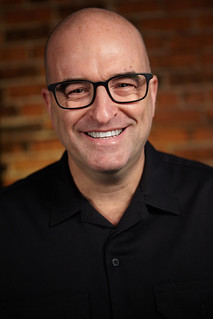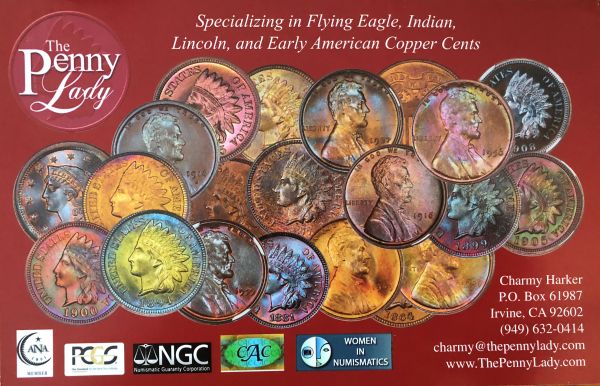
PREV ARTICLE
NEXT ARTICLE
FULL ISSUE
PREV FULL ISSUE
KELLEN HOARD INTERVIEW, PART ONEGreg Bennick's latest interview for the Newman Numismatic Portal is with Young Numismatist Kellen Hoard. Here's the first part, where Kellen talks about parental support for Young Numismatists and spreading the hobby by emphasizing the stories behind the coins. -Garrett GREG BENNICK: Hi everybody, Greg Bennick here with the Newman Numismatic Portal. Thanks for joining yet another interview in the series that I'm doing with prominent numismatists and interesting people. And I'm here today with Kellen Hoard. Kellen and I are co-inhabitors of the Pacific Northwest, and we're both here in the Northwest corner of the United States today. We're going to have a fun conversation. So, Kellen, thanks for hanging out. I appreciate it.
GREG BENNICK: You know, that never ends, right? As long as we have our moms with us, that's always true. I put out a book this last week. I had a book come out. And my biggest fan, I don't know how many copies she purchased, is indeed my mother. So that's exciting. KELLEN HOARD: My mother has been very supportive of numismatics for me generally. I started when I was nine years old, and so I couldn't drive myself anywhere. I really couldn't do much of anything. And so, she, even as a non-numismatist, was supportive and driving me to coin club meetings. My first show, which was the ANA Portland show in 2015, which was great. And she was totally there for me 100%. The day I turned 16, she said, "Go get your driver's license. You're taking yourself to your coin shows now. I was here for you while you weren't able to, but you are more than welcome to go do things all by yourself now." GREG BENNICK: Wow. I mean, I like that, though. I like that she was supportive. And I like that she kind of baby birded you out of the nest and said, "Go fly." KELLEN HOARD: That's right. Well, actually, the very first time I ever drove a car by myself, she said, "Go get me some candy at the store." So, I did. I said, "Okay, mom, thanks for letting me get my driver's license." I think that was kind of the trade-off, is that I would go get her something from the store in exchange for me kind of having that freedom. GREG BENNICK: That's great. And I'm assuming she still supports your collecting endeavors and or the work that you do. KELLEN HOARD: As much as a mother does who knows nothing about what I do. Again, totally supportive, but she'll have colleagues or friends say, "What's Kellen doing in coins?" And she can vaguely say that I am continuing to do coins, but perhaps not much more than that. So, it's the perfect amount of support from somebody who doesn't really understand. GREG BENNICK: I like that. That's actually an interesting question that I should be asking all interviewees. How do you integrate your coin life with your social life and other lives? Right? Because I'm fortunate enough to have a partner who has heard me talk about error coins enough that she's starting to know the difference between a clip planchet and a brockage. Right. But how do you do that? How do you how do you have conversations with other people in the world, who have no idea about the things you do? KELLEN HOARD: You know, that's a question you shouldn't have asked because it's a long answer, but I'll try and keep it short. The long and the short of it is" a couple different ways. So, I have a girlfriend here in Seattle, and she has learned so much just through osmosis, just being near me to the point where there was at some point, we were driving the car together and it came up. I was asking her coin trivia questions, and she was very game for answering these questions. And she knew most of them, which was shocking. Like I never explicitly, I don't think, taught her anything, but she just kind of absorbed it. Sometimes I'll get a cool new coin. She's excited to see that. I'm happy, I guess. But that's about it for there. But I am a columnist for The Numismatist, and I write it with three other young collectors. So, we replaced Dave Bower's column that he had run, but now we do a young collector's corner. And I'd written a column toward the beginning of college when I was in my freshman year. And I had been concerned because the kind of the classic story of numismatists is that they get interested in it when they're young, when they become teenagers, high school, college students, they kind of drop out their other interests, financial obligations, and so on. They come back to it kind of in their middle age when they kind of that rekindle the interest and they have a little bit more money. And then in their golden years, that's when they really get into it. They write and research and spend big money and really get back into the hobby. And I was concerned since I started collecting, like, "Oh my God, I'm going to fall into this trap of losing interest." Fortunately, I never have. And I've had opportunities to keep engaging. But it was interesting as I continue my interest going into college, going to Washington, D.C. for college. And I continue to have interest in coins and talk to my peers about them. And college students are fascinated by coins, specifically the stories, the context, the history, the learning opportunities. I mean, they're in a learning environment already. So, for them to be able to learn in kind of a new non-academia way, or at least the way I was presenting it to them, but more as history in your hands. They found it quite compelling. Which leads into kind of my broader philosophy is that with getting people engaged in the hobby, it's not that they're not interested. They just have no idea about the hobby. There's not some, especially younger people with myriad other opportunities for entertainment engagement. But they found it really quite compelling. And that was hopeful to me. And so, I give a lot of presentations to the public. I speak at a lot of retirement homes about numismatics or schools. And what I find there is they don't care about grades. They don't care about pricing. That could not be less relevant or interesting to them. But they love the story. They love the context. So, I've been building up basically a reference set of coins and tokens and paper money and medals, transcending time and space, in which each piece has some kind of context around its creation that I know the public's like, "Ah, I didn't even think about that." And they find it really quite compelling. And then they have an opportunity to actually hold it in their hands as well, as they hear me talk about it. So, in terms of social engagements with numismatics, to get back to your question is, yeah, socially, what I do is I share stories that I know are going to pique their interest. We never get into the granular details. They don't need to know about, you know, PCGS implementing plus grades. Nobody cares about that, even though I have some stake in that. But they're interested in socially how they can learn through the coins. They find that really quite compelling. So that's how I've really incorporated into my social life to not be the total geek. You know, it's not to kind of bore them with it, but to find opportunity to connect with them over, those coins. One last piece I'll add on this: when I'm at a lot viewing at a Heritage or Stacks Bowers sale at a show. I'll go to lot viewing and I can never afford any of it, but I have a great time looking at it. I always get the most expensive item I can find in the sale and just look at it because why not? That's your opportunity to. But the people who staff the lot viewing... they are not collectors. They're usually temp employees from the local area. And so, I again, I socialize with them through the coins. So many collectors just look at it themselves. I say, "Do you want to take a look at what I'm looking at?" and I tell them the story behind it. They love it. They're endlessly fascinated by this. They're sitting there all day thinking about it. So, you have an opportunity to then have an inlet with them and ask them, "Well, what are you interested in? What is anything you're interested in?" And this applies not just in lot viewing, but social lives generally. And they might say any number of things. I had a guy say he loves sailing. Phenomenal. Collect coins or tokens with boats on them. There's endless options at every budget level. I had a woman say that she was really in touch with her religion. Even better. Countless people collect coins related to different religious things. I had a girl at college say, "I just love getting wasted on the weekends." I said, "Great. Smirnoff has a line of tokens that you can collect." You know, Smirnoff vodka. You put it on the bump and you spin it around on the bump and the arrow points to who pays for the round of drinks, right? No matter what your interest is, there is something for you. So that's how you build that social connection as well, is that it actually does tie to something. You're basically talking about their interests in a numismatic lens. And they find that...I find really quite exciting. GREG BENNICK: I love that. John Kraljevich and I were talking the other night about how it's really all about the story. It's about the story behind the coin. KELLEN HOARD: He captured that story so well. GREG BENNICK: Yeah, for sure. I find that that's true. You know, you can talk to people about error coins. They're interested in how weird the coin looks, but the process behind it, maybe, but the thing that I collect that people find really fascinating, counterstamps, and the history of a merchant who counter stamped the coin and where they were from and why they stamped the coin. All of a sudden people are really interested in the story and the coin is a symbol of that. So, I love that you found that. KELLEN HOARD: I have Brunk's book on counterstamps somewhere on that shelf right there. Yeah, that's a great book.
To watch the complete video, see:
To read the complete transcript, see:
Wayne Homren, Editor The Numismatic Bibliomania Society is a non-profit organization promoting numismatic literature. See our web site at coinbooks.org. To submit items for publication in The E-Sylum, write to the Editor at this address: whomren@gmail.com To subscribe go to: https://my.binhost.com/lists/listinfo/esylum All Rights Reserved. NBS Home Page Contact the NBS webmaster 
|


